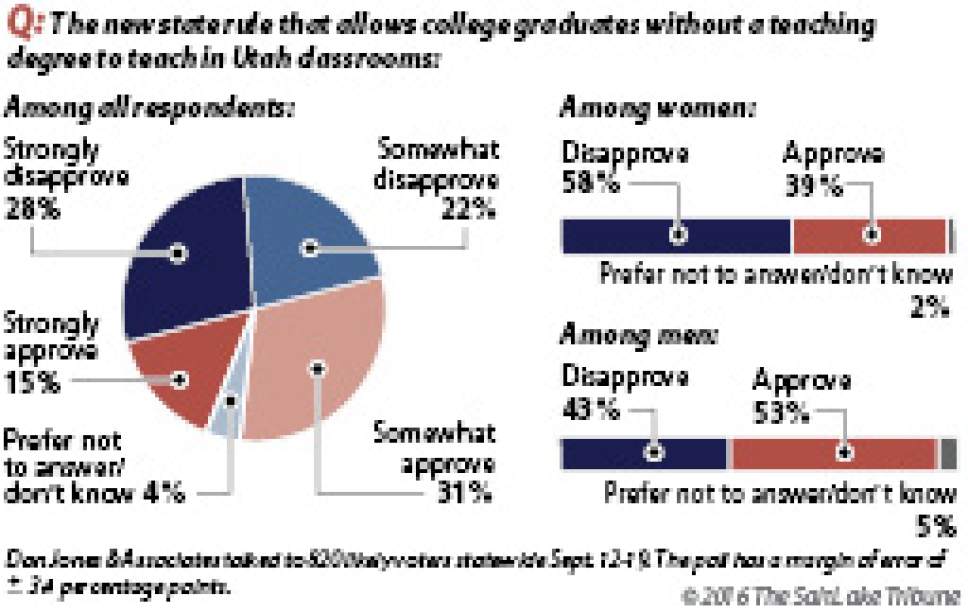This is an archived article that was published on sltrib.com in 2016, and information in the article may be outdated. It is provided only for personal research purposes and may not be reprinted.
Utahns are concerned about education, according to a new poll, but are divided on whether untrained educators should be allowed to teach.
A plurality of likely voters, 27 percent, identified education as the most important issue facing the state, ahead of topics like the economy (19 percent), public lands (6 percent), immigration (5 percent) and health care (4 percent).
But when asked about the new state school board rule allowing college graduates without teaching degrees to teach in public school classrooms, 50 percent of poll respondents disapproved of the policy, 46 percent approved and 4 percent either didn't know or preferred not to answer.
The poll included 820 likely Utah voters, and was conducted between Sept. 12 and 19 by Dan Jones & Associates for The Salt Lake Tribune and the Hinckley Institute of Politics. It has a margin of error of plus or minus 3.42 percentage points.
"As with any new program," school board Chairman David Crandall said, "it's going to take awhile for everybody to understand the nuances."
The school board policy, known as the Academic Pathway to Teaching, or APT, gives school districts and charter schools the option of hiring teachers who did not complete a traditional education training program.
It is one of several alternate routes to become a licensed Utah teacher, but differs from other such programs in that there is no requirement to complete formal pedagogy training, such as classroom management or lesson-planning skills.
Instead, APT candidates must have a bachelor's degree in a subject area, such as math or history, demonstrate content knowledge and work under the mentorship of an experienced educator for three years.
Salt Lake City Democrat Rep. Joel Briscoe, a former educator, said the program is "a stopgap measure at best" to addressing staffing shortages at Utah schools. And it does not show respect to the state's professional educators, he said.
"It is a statement to teachers in the classroom currently that anyone can walk in and do your job with a little bit of mentoring," Briscoe said. "I believe that is fundamentally false."
Heidi Matthews, president of the Utah Education Association, said students deserve teachers who are ready to teach and inspire on the first day of class.
If unprepared educators are hired through APT, she said, then the program would exacerbate the teacher shortage it was designed to solve.
"We are placing underqualified people in front of our students and having them learn on the job," she said. "That's not good for kids."
Among the participants in the Dan Jones poll, 28 percent said they "strongly disapproved" of APT, compared to 15 percent who were in strong support of the program.
Women were more skeptical of the new rule, with 58 percent disapproving of APT and 39 percent approving it.
Men backed APT by a margin of 53 percent to 43 percent.
Crandall said it is important for the public to remember that APT is optional, providing another method for school districts and charter schools to fill classrooms with content experts.
"Hopefully, as time goes on," Crandall said, "that will become more clear to the public in general and we'll start to see the benefits of that option."
But Briscoe said the administrators who employ APT teachers will likely do so out of "duress."
"We're talking about students voting with their diplomas not to go into public education," he said. "Where is the plan from the state Board of Education to build the profession, to make teaching something people want to do and feel proud of?"
Last week, lawmakers held a preliminary discussion on legislation that would create a pedagogy test, similar to a board exam, for public education teachers.
Ogden Republican Sen. Ann Millner said the idea behind the bill predates APT, but, if enacted, would ensure that all teachers have classroom-management skills independent of how they entered the teaching profession.
She said the test would be a counterpart to Praxis, a content mastery exam required of all teachers. It would be completed either at the completion of an education degree or roughly two years into the classroom career of an alternate-route candidate.
"I don't want to be prescriptive about the design of [training] programs," Millner said. "There's more than one way of preparing an effective teacher."
Briscoe said a pedagogical exam is "an interesting possibility."
He said he was not familiar enough with the draft legislation to comment, but added that any education initiative requires investment to be successful.
"You can do it quick and dirty and cheap or you can do it well," he said. "You get what you pay for."
Twitter: @bjaminwood



